The world can be an ugly place. We are reminded of just how ugly with tragedies like the mass shooting in Orlando that left 49 people dead and more wounded.
From my seat here in Pittsburgh, Orlando seems far away. But it’s not, not really. Those people who died—I may never have met them, but they are my fellow humans, and that is enough.
So, for those who, like me, feel this loss acutely even from hundreds of miles away, I want to remind you that there is still beauty in the world. There is hope. There is light. You can find that light in different ways—a good hike, a night out (or in) with friends, a good book.
I can’t give you a good hike (though we do have wonderful parks here in Pittsburgh and I can attest to the healing power of nature) or a night out with friends, but I can share some of my favorite books by LGBTQ authors.
Often books about LGBTQ characters focus on struggles: being disowned by parents, facing discrimination in the workplace, or just trying to figure out how they feel and who they are. Those problems are compounded for LGBTQ people of color as they cope with multiple cultures, conflicting identities and racism. Even if you don’t identify as gay, trans or queer, even if you’re white, a lot of these struggles are universal.
Haven’t we all done something we fear will send our parents over the edge and make them kick us out? Haven’t we all struggled with answering the ultimate existential question of who we are?
My guess is yes. So check out one of these books. Read it. And remember that you are not alone, and that there is light left in the world.
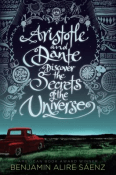
Aristotle and Dante Discover the Secrets of the Universe by Benjamin Alire Saènz
Aristotle and Dante meet at a pool and together begin to overcome their loneliness and melancholy. This is a book about identity and learning to accept people, including oneself, for who they are, without judgement. It’s a quiet, poetic sort of book, with a focus more on the characters’ internal lives instead of external action. Aristotle and Dante aren’t only dealing with their identities as a gay teens in the late 1980s, but with their identity as Mexican-Americans. (Here are a few book lists for further reading on Latino/a LGBTQ authors). It’s a sweet book that focuses on friendship and healing.
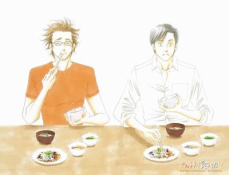
What Did You Eat Yesterday? by Fumi Yoshinaga (graphic novel)
This is a sweet, delicately-drawn slice-of-life manga (a Japanese comic book) about a couple living in Tokyo. Kenji is an out-and-proud hair dresser, but his partner, Shiro, is a closeted attorney who happens to love cooking—especially when he can get a deal on something at the supermarket. The manga series follows these two characters’ lives, and goes into special detail when Shiro is cooking for Kenji. There is so much detail that you could easily make any one of the recipes featured in the book. It’s almost like a cooking show in comic form. What makes it so enjoyable to read, though, is the sweetness of Kenji and Shiro’s relationship, and their differences and similarities. If you feel overwhelmed with sadness, give What Did You Eat Yesterday? a try. It will almost certainly cheer you up.
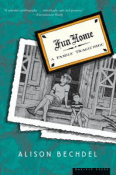
Fun Home by Alison Bechdel (graphic memoir)
Alison Bechdel’s first graphic memoir has become a part of both the comic book and LGBTQ canon for good reason: Bechdel tackles the complexities of her relationship with her father, her father’s closeted sexuality, the questions surrounding his possible suicide, and her own sexuality with ease and grace. She neither glorifies nor demonizes her father for his actions, and instead seeks to simply understand. But she also has to come to understand herself. Although sad at times, this is a book that will ultimately leave you feeling uplifted and like maybe the world is going to be okay after all.
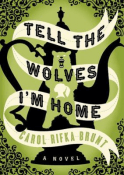
Tell the Wolves I’m Home by Carol Rifka Brunt (fiction)
In 1987, June’s uncle Finn—her favorite person in the world—dies from AIDS, but she doesn’t know that’s what his illness is called. As June struggles to cope with Finn’s death, she receives a package from someone named Toby at Finn’s address. Hesitantly, she meets with him. She learns that her uncle was gay, and that Toby was his life partner. Slowly, June and Toby open up to each other as they realize how deep and fierce their love for Finn remains, even after his death. This is a beautiful coming-of-age novel that explores love, acceptance and growth. It’s also beautifully written. It might make you cry, but you will feel richer for having spent some time with June and Toby.
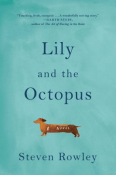
Lily and the Octopus by Steven Rowley (fiction)
This is a book about love, loss and recovery. It’s not necessarily an easy read, but it was cathartic and healing for me on a number of levels. Ted lives with his 12-year-old dachshund Lily. On Tuesdays they talk about boys they like. On Fridays they watch movies together. Every night Lily sleeps cuddled next to Ted. Ted goes on a lot of first dates with guys he meets online, but not many second or third dates. He’s lonely, but refuses to admit it. He has Lily. But then the octopus comes, and changes everything. Lily starts having seizures. Ted tries his damnedest to get rid of the octopus, but slowly it unravels the threads of his life. If you have ever had a dog or cat, this book will probably make you cry, but it will also make you feel less alone. It will make you think, “I thought I was the only one.” Ultimately, this isn’t a sad novel, though. It’s hopeful and vibrant, like a rainbow after a storm. It reminds us that even when we lose people (and animals) we love, they are never truly gone, and there is life—and joy—even after their deaths.
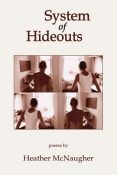
System of Hideouts by Heather McNaugher (poetry)
McNaugher is a local queer poet who writes about identity, family, gender and sexuality. Her poetry is sometimes brutal as she puts people and their actions under the microscope, questioning their motives, desires and intentions. She gives herself the same treatment, and uses self-deprecating humor throughout her work. Gender and gender fluidity are frequent topics, and she explores both their broader and more personal meanings through short narrative scenes. If you have ever struggled to understand what it means to be gay, lesbian, queer or trans, this collection will help you get there with ferocity, compassion and humor.
What’s your favorite novel, memoir or poetry collection by an LGBTQ author? What books have helped you heal? Let us know in the comments.
What to read after Orlando
Read Fun Home nowKelly reads, writes and sometimes sews, always with a large mug of tea. Her job as the Clerical Specialist at CLP – West End gives her plenty of ideas for stories that find homes in obscure literary magazines.
